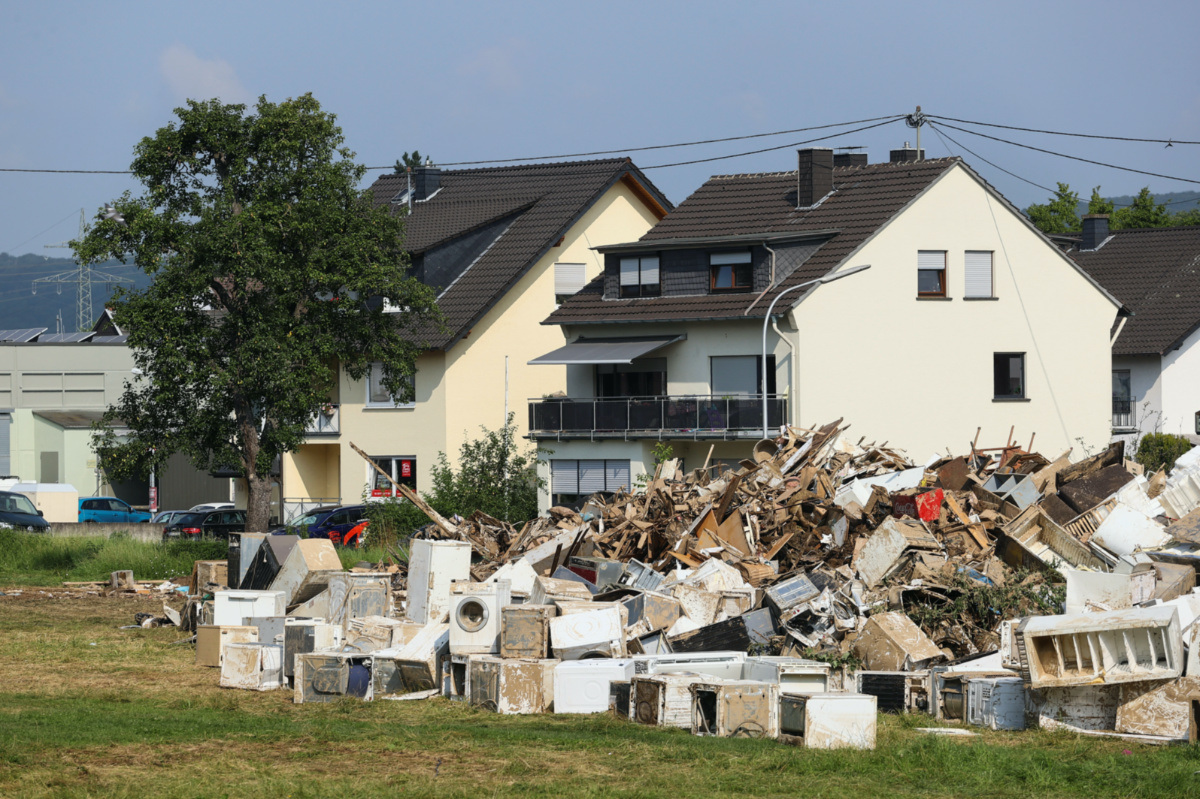Berlin, Germany
Reuters
German authorities faced pressure on Tuesday to set aside longstanding privacy concerns and send mobile phone alerts directly to people in potential disaster zones following the devastation wrought by last week’s catastrophic floods.
Unlike many other countries, including Japan, Israel and New Zealand, Germany has no way of sending text messages en masse to citizens about extreme weather events, partly due to the experience of oppressive surveillance in the country’s formerly Communist east and under Hitler’s Nazi regime.

German Chancellor Angela Merkel and North-Rhine Westphalian State Premier Armin Laschet visit the area affected by floods caused by heavy rainfalls, in Iversheim, a suburb of Bad Muenstereifel, North-Rhine Westphalian state, Germany, on 20th July. PICTURE: Reuters/Wolfgang Rattay/Pool
Some government ministers and senior officials have already called for a change as Angela Merkel’s government fends off accusations that its preparedness systems were woefully lacking, despite severe weather warnings from meteorologists.
“This flood disaster must be a wake-up call to everyone that we should not only discuss data protection, but also the real protection of citizens against disasters,” Transport Minister Andreas Scheuer told Bild, Germany’s biggest circulation daily.
The floods, which have killed at least 170 people and caused untold destruction, have dominated the political agenda some 10 weeks before a national election in September and raised uncomfortable questions about how Europe’s richest economy could be caught flat-footed.
In Germany’s decentralised system, responsibility for disaster protection is split between the Federal Government and regional and local authorities, but officials have rejected suggestions they had done too little to prepare.
The confirmed death toll rose by five to 170 on Tuesday as the recovery operation revealed further bodies. Rescuers in the worst-hit regions rushed to clear debris and sewage and provide safe drinking water to help avert a public health crisis.
Several experts said the unprecedented scale of the floods meant existing defences would inevitably be overwhelmed. But critics pointed to failures in warning sirens that had been allowed to fall into disuse, delayed evacuations as well as patchy mobile phone warning systems whose efficacy was limited due to networks being knocked out.
Critics argue that little has changed since the BBK civil protection agency held an emergency warning day in September to test the nation’s alerting infrastructure, which went far from smoothly. The system overloaded, preventing many people from receiving push alerts.
Merkel, visiting the devastated town of Bad Muenstereifel, said authorities would look at what had not worked but cautioned that mobile phone alerts, such as those used to warn airline passengers of delays, could not always be relied on.
“That obviously stops working when the mobile phone system fails,” she said. “And that happened extremely quickly.”
Costs
Almost 20 years since then-centre-left Chancellor Gerhard Schroeder won re-election in large part because of his assured response to severe floods in eastern Germany, the disaster has inevitably cast its shadow over the September ballot.
An opinion poll conducted since the flooding began last week showed a slight gain for Merkel’s Christian Democratic Union party. But Armin Laschet, the state premier nominated by the conservative party to succeed her as chancellor, has seen his own approval hit after he was filmed laughing as President Frank-Walter Steinmeier visited one of the flood zones.

Rubble and debris are seen in an area affected by floods caused by heavy rainfalls in Sinzig, Germany, on 20th July. PICTURE: Reuters/Wolfgang Rattay
The financial cost of Germany’s worst natural disaster in almost 60 years will also weigh heavily on the next government.
Coming on top of unprecedented spending on coronavirus relief measures, the cost is sure to run into the billions. Bavarian Environment Minister Thorsten Glauber said his southern state would spend €40 billion on flood defences in the coming 20 years.
For immediate relief, the federal government plans to provide €200 million in emergency aid to repair buildings and damaged local infrastructure, and to help people in crisis situations, according to a draft document due to go to the cabinet on Wednesday.
That will come on top of €200 million that would come from the 16 federal states. The government also hopes for financial support from the European Union’s solidarity fund.
Meanwhile, actuary company MSK said on Tuesday that the floods are estimated to have caused more than one billion euros in insured losses.
– Additional reporting by ANDREAS RINKE, MARIA SHEAHAN, THOMAS ESCRITT and ALEXANDER HUEBNER






